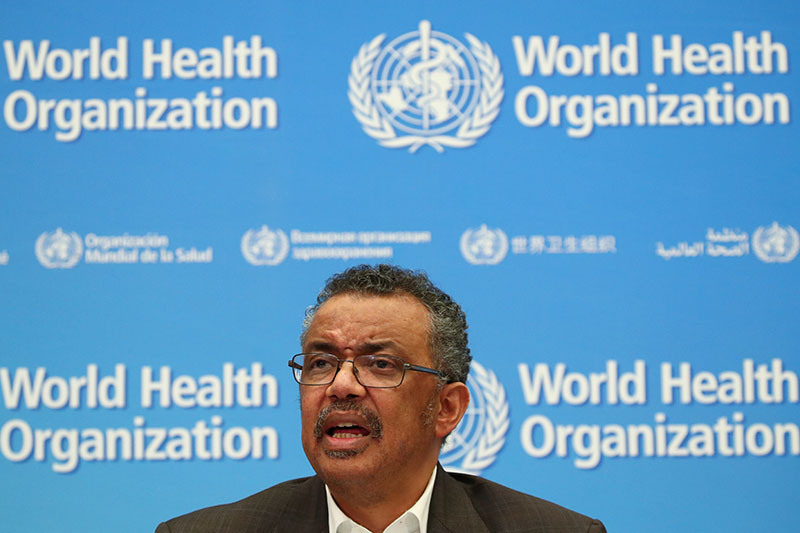WHO head defends handling of coronavirus pandemic against Trump criticism
GENEVA: The head of the World Health Organization gave a strident defence of his agency's handling of the coronavirus pandemic on Wednesday, in response to US President Donald Trump's criticism and suggestions that Washington could review its funding for the agency.
WHO Director General Tedros Adhanom Ghebreyesus called for unity and a halt to "politicization" of the global health crisis, specifically urging China and the United States to show "honest leadership".
Tedros said he expected US funding to continue with traditional bipartisan support.
Trump and his administration repeated its criticism, on Wednesday. Secretary of State Mike Pompeo said Washington was re-evaluating US funding to the body, saying international organizations utilizing US taxpayer money needed to deliver on their goals. But he objected to a leadership change at the WHO at this time.
US contributions to the WHO in 2019 exceeded $400 million, almost double the second-largest country donor, according to US figures. The WHO website shows the United States as its top donor, contributing nearly 15% of the budget.
Trump told the daily White House briefing on the coronavirus that Beijing's payment was a small fraction of Washington's WHO contribution, and that was "not fair at all."
"So, we're going to do study, investigation. And we're going to make a determination as to what we're doing. In the meantime, we're holding back. We ... want to see."
Trump said the WHO issued a statement on Jan. 14 saying "there was no human-to-human transmission" and criticized him "very strongly" when he said he was going to shut down flights from China.
Tedros said the WHO had "kept the world informed about the latest data, information and evidence" and noted that Thursday would mark 100 days since China first notified the organization of cases of "pneumonia with unknown cause" on Dec. 31.
Tedros, a former foreign minister of Ethiopia, rejected Trump's suggestion that the WHO was "China-centric", saying: "We are close to every nation, we are colour-blind."
Earlier, Dr Bruce Aylward, senior adviser to Tedros, also defended the UN agency's relationship with China, saying its work with Beijing authorities was important to understand the outbreak.
"It was absolutely critical in the early part of this outbreak to have full access to everything possible, to get on the ground and work with the Chinese to understand this," said Aylward, who led a WHO expert mission to China in February.
In an interview with KDKA Radio, Pompeo said: "I think it’s pretty clear that the World Health Organization hasn’t lived up to its billing, it hasn’t been able to achieve what it was designed to achieve, and we just can’t continue to permit that to go on. We’ve got to find a way."
Pompeo was asked at the coronavirus briefing whether it was time to change the WHO leadership and replied: "This is not the time to be doing that kind of change."
'WE MAKE MISTAKES'
In New York, UN Secretary-General Antonio Guterres said on Wednesday now was not the time to assess the global response to the pandemic, calling instead for the international community to focus on working in solidarity to stop the virus.
Tedros said his UN agency would conduct its usual assessment of its performance after the emergency and draw lessons about its strengths and weaknesses, adding: "We make mistakes like other human beings."
He summarised his advice as: "Please, unity at national level, no using COVID for political points. Second, honest solidarity at the global level. And honest leadership from the US and China."
"The most powerful should lead the way and please quarantine COVID politics," he added, referring to COVID-19, the highly contagious, sometimes deadly illness caused by the new coronavirus.
Tedros said Beijing and Washington should follow the example of what the former Soviet Union and the United States did in 1967 when they launched a 10-year global campaign that eradicated smallpox, a disease then killing 2 million people annually.
Tedros rejected "racist slurs" against him, which he said had originated in Taiwan, and disclosed that he had also received a death threat during the crisis.
"We are losing people, why would I care about being attacked when people are dying?" he said, noting there were already "60,000 body bags" after more than 1.3 million infections.
"We will have many body bags in front of us if we don't behave," he added.






